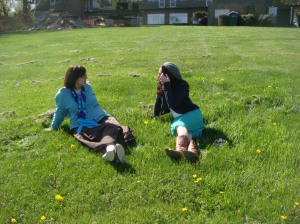Written by Leiba Estrin
 How can a mother care for her child if her mental state of mind is out of sync? Can a farmer clean and feed his animals if he neglects to care for his own health? As humans who care about the Earth, it can be argued that we are all environmentalists in our own way. When considering the scope of the movement, people forget that it is more than about preserving natural resources and saving forests, plants and animals. The importance of taking care of ourselves before turning to help others cannot be overstated. If our bodies and minds remain strong, healthy and whole, then we will be better equipped to help the Earth and those that call it home. But if we find ourselves in a negative space, whether emotional, mental or physical (and they are all interconnected), then we will not be able to contribute to the world as our best selves. Preserving our bodies shows that we mean to treat ourselves with respect. The ideal situation is to be at our best so that we can reach our full potential.
How can a mother care for her child if her mental state of mind is out of sync? Can a farmer clean and feed his animals if he neglects to care for his own health? As humans who care about the Earth, it can be argued that we are all environmentalists in our own way. When considering the scope of the movement, people forget that it is more than about preserving natural resources and saving forests, plants and animals. The importance of taking care of ourselves before turning to help others cannot be overstated. If our bodies and minds remain strong, healthy and whole, then we will be better equipped to help the Earth and those that call it home. But if we find ourselves in a negative space, whether emotional, mental or physical (and they are all interconnected), then we will not be able to contribute to the world as our best selves. Preserving our bodies shows that we mean to treat ourselves with respect. The ideal situation is to be at our best so that we can reach our full potential.
This past Sunday I helped put together a Spring Retreat at Chatham University’s lovely Eden Hall campus through the Jewish student organization on Campus, Chabad on Chatham. The retreat focused on a religious and spiritual approach towards rejuvenating the mind, body and soul. We (myself and other members of the group) called the event “Tikkun Olam – Healing the World and Ourselves, One Deed at a Time.” “Tikkun Olam,” a Hebrew phrase that means “fixing the world,” is a concept that is found all over the environmentalist movement. Environmentalists the world over endeavor to fix whatever they see is lacking in the world, whether it be arsenic found in rice, poisonous water caused by hydraulic fracturing, or severe climate change. It is all a healing process, one that begins with each individual. Through Chabad on Chatham, we brought a wonderful guest speaker, Rus Devorah Wallen, who led several self-improvement workshops that carried a distinctly religious tone. Perhaps Michael Crichton would not have approved of this event that combined a religious approach with logic and emotion that sought to promote physical and mental well being, but since the event was a success, Crichton is welcome to disapprove as much as he likes.
The workshops blended one into the next. Rus Devorah began with the idea of preventative self-healing through Torah (the Hebrew Bible). Most people understand preventative medicine to be a much better alternative than dealing with illnesses after they occur. Staying in the preventative medicine stage is the ideal state for every individual. Rus Devorah explained that afflictions of the mind are strongly connected with physical ailments, meaning that an upset state of mind can lead to negative physical symptoms. She concluded the hour by saying that positive individuals will end up leading more positive and healthy lives.
The next workshop focused on mindfulness (being self-aware) and meditation in order to relax and alleviate stress. Rus Devorah guided us through a couple of short meditations, one religious and one neutral, as we focused on our breath. We found ourselves supremely relaxed, so for the third and final workshop, Rus Devorah gave us practical tips for improving ourselves. She introduced the idea that each individual possesses three garments to express ourselves: thought, speech and action. She methodically went through each element, giving real advice on the best ways to overcome challenges we face in our minds, in the words we use, and in our actions.
The combination of the lovely Eden Hall campus with the delightful company of friends and familiar faces, with the addition of a delicious breakfast, lunch and supper prepared by the members of the Chabad on Chatham organization, and the guided self-improvement workshops geared toward personal growth, all came together to produce a refreshing and wholesome experience. I came away with a newfound appreciation for being alive and healthy, counting my blessings and always looking for ways to improve.
Sources:
Crichton, Michael. “Environmentalism as Religion.” http://www.pe.tamu.edu. Commonwealth Club: San Francisco, 2003. Web. 2 May 2013.
Cullinane, P. “Purposeful Lives, Civic Engagement, And Tikkun Olam.” Generations 32.2 (2008): 57-59. CINAHL with Full Text. Web. 7 May 2013.